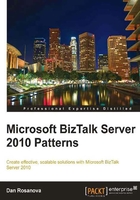
Introducing the BAM portal
Another component of BAM is the portal that ships with BizTalk to allow us to view the data we are tracking and monitoring with BAM. The BAM portal is a simple SharePoint inspired website that installs as part of a BizTalk installation. It is a fairly light weight tool that allows us to build and run queries based on the tracking data that we have defined. It allows for sorting and also for saving queries and also creating alerts based on these queries. Finally, it has interactive charting capabilities built into it that allow users to drill down into aggregations we define in the activities and views. The portal is not the only way to interact with BAM, however. We can also access the underlying SQL infrastructure either through ADO or even via SharePoint's Business Connectivity Services.
Presenting BAM alerts
Finally after detailing all that we have here we get to the subject of BAM alerts. Alerts in BAM are user-created notifications that can be tied to simple BAM queries or even complex aggregations. BAM alerts (and BAM in general) really spearhead the concept of self service in IT. What specifics interest users will change depending upon who the user is, business conditions at the time, and often even the time of year. BAM alerts allow users to decide when they want alerts and give them an ability, through the BAM Portal, to configure them.
BAM alerts are either via e-mail or a file. I only use the file ones to trigger other BizTalk processes, as we'll see later, but the e-mails are very popular with users. Perhaps a user wants to be notified when a very large order (or very large check) is received (or requested). Or perhaps they want to be alerted by the result of an aggregation, such as a specific client orders more than X dollars within Y months. All of these can be linked to user-created BAM alerts. This frees our time as developers to focus on higher value tasks while still getting our users exactly what they want. Better yet, they still think we're rock stars because of it.